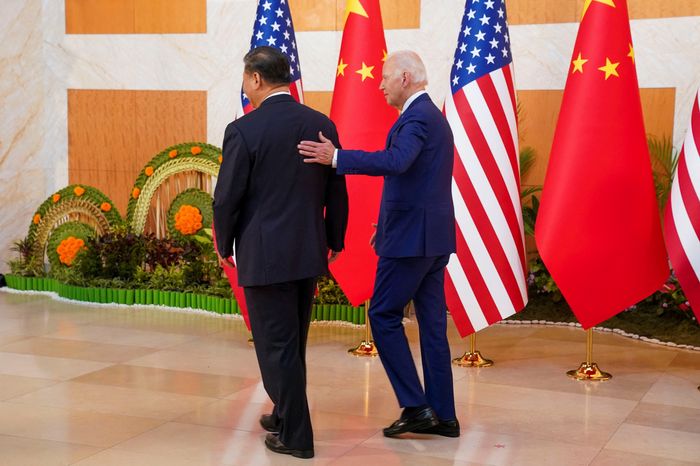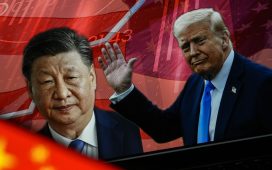China is likely to nominate
Xie Feng,
a vice foreign minister and a U.S. specialist, as its new ambassador to Washington, according to people familiar with the matter, continuing a gradual tempering of the abrasive “Wolf Warrior” style that has defined Chinese diplomacy in recent years.
Beijing has been recalibrating its foreign policy in a bid to stabilize fraught ties with Washington and mitigate damage done to China’s global standing by its handling of the Covid-19 pandemic and forceful pursuit of security, industrial and territorial interests, according to people working inside the Chinese Foreign Ministry. The hard-charging ethos that took hold among Chinese diplomats during the Trump administration, when Beijing saw itself as being under assault from the West, needs to be adjusted to reflect a changing international environment, they said.
The shift has begun to show up in recent and coming foreign-policy appointments, which put veteran diplomats—known for their ability to balance combativeness with cordiality—in key positions to manage Beijing’s foreign relations.
Mr. Xie, 58 years old, is regarded by both colleagues and foreign counterparts as a firm and evenhanded conduit between China and the U.S. He helped arrange a high-profile summit between Chinese leader
Xi Jinping
and President
Biden
in November, and served as Beijing’s point man in complex negotiations on a 2021 prisoner-exchange deal that yielded China’s release of two Canadian citizens in return for ending U.S. efforts to extradite a well-connected Chinese executive detained in Canada.
A decision to name Mr. Xie envoy to the U.S. hasn’t been formalized, but there are no other strong candidates, said the people familiar with the matter. Beijing would need to submit Mr. Xie’s name for Washington’s agreement before officially appointing him.

China’s Xi Jinping has presented a friendlier face in meetings with international counterparts, including President Biden at a G-20 summit in Indonesia in November.
Photo:
KEVIN LAMARQUE/REUTERS
Naming Mr. Xie envoy to the U.S. “could be a signal that Beijing wants to better manage the rivalry with Washington,” said
William Klein,
a consulting partner at the communications advisory firm FGS Global and a former U.S. diplomat with extensive experience in China affairs.
If appointed, Mr. Xie would replace
Qin Gang,
a trusted Xi subordinate who won promotion to foreign minister in late December. Mr. Qin is in contention to take a concurrent post as a state councilor, a senior government rank that would put him in the upper tiers of national leadership and give him the status to deal more equally with the U.S. secretary of state, according to people familiar with the matter.
Mr. Qin has been a leading proponent of a truculent approach to foreign policy that Mr. Xi favors, though people who have dealt with him say he is a more nuanced operator than some of his openly caustic subordinates.
Some foreign-policy analysts say the appointments represent a tactical shift by Beijing, rather than a complete pivot away from Mr. Xi’s forward-leaning style. “Strategically, they are still going to cajole, bully, arm-twist wherever they can, but perhaps a tad more politely,” said
Dylan Loh,
an assistant professor at Singapore’s Nanyang Technological University who studies China’s foreign policy.
The Chinese Foreign Ministry didn’t immediately respond to a request for comment.
Mr. Xi returned to the global stage in recent months after more than two years of self-imposed isolation under China’s strict pandemic controls—during which Beijing’s relations with Western powers and some Asian neighbors soured over issues spanning trade and technological competition, human rights, and territorial disputes.
Following his first overseas trip last fall since early 2020, Mr. Xi has presented a friendlier face in meetings with international counterparts, including President Biden at a summit in Indonesia, and other Western leaders.
Chinese officials will still act firmly to counter what they perceive as foreign attacks against their country, especially with regard to China’s core interests, people familiar with Beijing’s diplomatic thinking said. In recent days, for instance, Chinese authorities suspended the issuance of short-term visas to South Korean and Japanese nationals in response to travel restrictions that those countries have imposed on travelers from China to curb the spread of Covid-19.

A mask-wearing demonstrator overlooking pro-democracy protesters marching in 2019 in Hong Kong, where the likely new Chinese ambassador to the U.S. was China’s top diplomat.
Photo:
Ivan Abreu/Bloomberg News
Mr. Xie, a veteran diplomat, is well acquainted with Western officials through past roles handling U.S. and North American affairs, including two stints at the Chinese Embassy in Washington. He served as China’s envoy to Indonesia and the foreign ministry’s top representative in Hong Kong before his promotion to vice foreign minister in 2021. Mr. Xie also spent time as an exchange fellow in North Carolina in 1999.
Mr. Xie is a close protégé of
Yang Jiechi,
who retired in October as China’s top diplomat. The two forged a strong relationship while working together at the Chinese Embassy in Washington, according to people familiar with Mr. Xie.
People who have met Mr. Xie say he is a low-key and cautious official. “Charming or tough, his tone and pitch depend on the overall atmosphere of the relationship,” the priorities set by the top foreign-policy leadership, as well as the setting, audience and timing, said Mr. Klein, the former U.S. diplomat.
When antigovernment unrest rocked Hong Kong between 2019 and 2020, Mr. Xie, as Beijing’s top diplomat in the city, often criticized the U.S. for allegedly interfering in Hong Kong affairs, even as he tried to maintain cordial relations with foreign diplomats and businesses, the people said.
Zhao Lijian,
a Chinese foreign-ministry spokesman considered one of Beijing’s most prominent wolf warriors, was recently reassigned internally to a department that oversees issues related to China’s borders and maritime claims.
Known for his abrasive rhetoric against the West, Mr. Zhao retained his existing rank after transferring to the foreign ministry’s Boundary and Ocean Affairs Department, where he is now the most senior deputy director general, according to the ministry’s website. Though Mr. Zhao’s new role carries a lower public profile, the position would involve frequent dealings with foreign officials on contentious border and maritime issues, including territorial disputes that have intensified under Mr. Xi, current and former Beijing-based diplomats say.
“His new job, while not as publicly visible as that of deputy spokesman, nonetheless plays a vital outward-facing role in China’s diplomacy,” Mr. Klein said. “There is no shortage of examples of Chinese diplomats making such lateral moves before going on to more senior assignments.”
—Charles Hutzler contributed to this article.
Write to Keith Zhai at keith.zhai@wsj.com and Chun Han Wong at chunhan.wong@wsj.com
Copyright ©2022 Dow Jones & Company, Inc. All Rights Reserved. 87990cbe856818d5eddac44c7b1cdeb8











